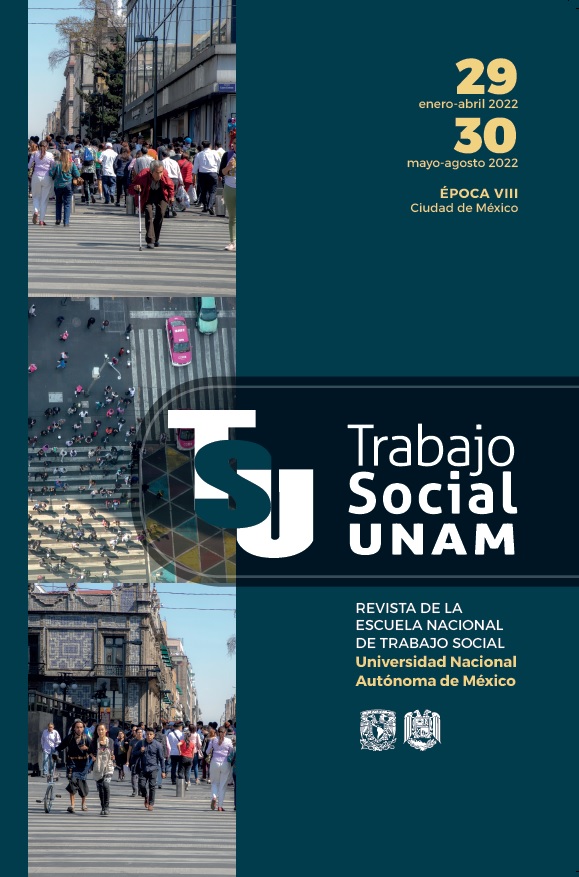La situación-problema como unidad de análisis epistémico para el Trabajo Social Contemporáneo
Main Article Content
Abstract
The following work aims to present what an epistemic analysis unit is and how this concept can be relevant for the analysis of the epistemology of social work. Based on this concept, three dominant units of analysis are presented in Latin America: social needs and problems, the social question and the problem-situation. Based on this, I defend the thesis that the problem-situation is a much more adequate unit of epistemic analysis in contemporary social work, since it allows a much clearer transition from an analysis of the social to intervention in the social. Arguments and contrasts are presented between the problem-situation and the other units of epistemic analysis, in order to understand the advantages and disadvantages of each of these proposals. It concludes with the importance of thinking in terms of units of epistemic analysis to the epistemology of social work. This allows us to have greater clarity about what are the epistemic tools and the intervention practices that are constituted from each one of them.
Article Details
Citas en Dimensions Service
References
Baumann, P. (2016). Epistemic contextualism: A defense (First edition). Oxford University Press.
Brown, J. (1933). The Rural Community and Social Work Case. Nueva York: Family Welfare Association of America.
Cano Soriano, L., Avalos Pérez, R., Rodríguez Velázquez, Daniel, Rosas Gutiérrez, Araceli, Solás San Vicente,Silvia, Zúñiga Macías, Esther, Arteaga Basurto, Carlos, & Carreón Guillén, J., Valero Chávez, Aída Imelda, Silva Arciniega, María del Rosario, Bautista López, Elizabeth, Acevedo Alemán, Jesús, González Tovar, José (2012). Investigación en trabajo social: Retos y perspectivas.
Carballeda A. (2004) La intervención en lo social: Exclusión e integración en los nuevos escenarios sociales. Paidós.
Carballeda, A.J. (2018). Ensayo sobre la Cuestión Social. Revista Trabajo Social UNAM, 19, 117-128. http://www.revistas.unam.mx/index.php/ents/article/view/70318/62109
Chinchilla, M. en Verano TIC (2022). Red Académica Verano TIC - 10:00 a.m. (GMT-6) hora México [Video]. YouTube. https://www.youtube.com/watch?v=6toZJvjGwAs
Chrisman, M. (2018). Epistemic Normativity and Cognitive Agency: Epistemic Normativity and Cognitive Agency. Noûs, 52(3), 508-529. https://doi.org/10.1111/nous.12184
Fink, A. (1942). The field of social work. New York: H. Holt.
Galeana de la O., S., (Eds.). (1999). Promoción social :[una opción metodológica] (1. ed). Universidad Nacional Autónoma de México, Escuela Nacional de Trabajo Social.
Goldberg, S. (2018). To the best of our knowledge: Social expectations and epistemic normativity (First edition). Oxford University Press.
Graham, P. J. (2015). Epistemic Normativity and Social Norms. En D. K. Henderson & J. Greco (Eds.), Epistemic Evaluation (pp. 246-273). Oxford University Press. https://doi.org/10.1093/acprof:oso/9780199642632.003.0011
Malagón, E. (2000) Lo social y los problemas. Revista Tendencias y Retos, Facultad de Trabajo Social, Universidad de la Salle, No. 5.
Netto, J. (2003) Cinco notas a propósito de la cuestión social en Borgianni,
E., Guerra, Y., y Montaño, C. (eds.) (2003). Servicio Social Crítico: hacia la construcción del nuevo proyecto ético-político. Cortez Editora.
Restrepo Giraldo, F. J. (2002). EPISTEMOLOGÍA DEL TRABAJO SOCIAL. Trabajo Social, (4), 23–30. https://revistas.unal.edu.co/index.php/tsocial/article/view/32512
Richmond, M. (2001). ¿Qué es el trabajo social con casos individuales? Buenos Aires: Lumen.
Rozas Pagaza, M. (2015). Reinscribir la relación de la intervención profesional en trabajo social, la cuestión social y las políticas sociales. Tendencias & Retos, 20(1), 105-116. https://dialnet.unirioja.es/descarga/articulo/5097448.pdf
Sperber, D., Clément, F., Heintz, C., Mascaro, O., Mercier, H., Origgi, G., &
Wilson, D. (2010). Epistemic Vigilance. Mind & Language, 25(4), 359-393. https://doi.org/10.1111/j.1468-0017.2010.01394.x
Tello, N. (2010) Ires y venires del Trabajo Social. Trabajo Social UNAM, (6), 1, 60 - 71.
Toledo, U. 2004. ¿Una epistemología del trabajo social? Cinta moebio 21: 200-214. www.moebio.uchile.cl/21/toledo.htm
Urbalejo, C. (2021). Reflexiones en torno a la manera de problematizar lo social en el Trabajo Social. (27-28), 59-74. Trabajo Social UNAM
